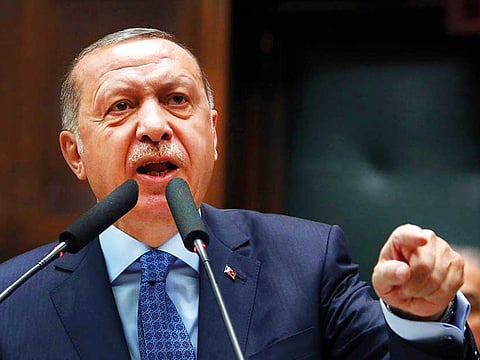Turkey’s balancing act upsets ties with West
Ankara’s proximity to Russia riles Europe, Nato and America, as Erdogan gambles on reining in Iran’s ambitions in Syria

The recent Ankara meetings of Turkey, Russia and Iran which brought together Recep Tayyip Erdogan, Vladimir Putin and Hassan Rouhani had all the trappings of a political, strategic and economic melange lumped together in one package. It was not one thing but a mishmash of issues under the big headline of protecting the territorial integrity of Syria and getting rid of extremists groups, though this is only the tip of the iceberg.
But surely the last point seems to be contradictory in terms for Moscow, Tehran and Ankara have each different political objectives and are not afraid of saying so. While Russia and Iran seem to be on the same wavelength in appearing to support the Bashar Al Assad regime, in spite of the fact they are doing it for different strategic reasons and logic, Turkey supports a different workhorse, standing as the black sheep of the family as it were. Turkey is in Syria as a long-time supporter of different opposition groups interested in getting rid of the Al Assad regime and as a force to blow out the strength of the Kurdish minority there and for geopolitical factors that seems to be saying if other powers bag a place in the country so we can too.
However, despite their attempt to show a united force of emerging regional and possibly international powers, certainly true as far as Russia is concerned, the Ankara meetings, and regardless of the gloss, has shown an emerging axis. This is regardless of the fact; this doesn’t probably exist and might be construed as a figment of one’s imagination and because of disparate objectives of these powers, not forgetting of course, the strong religious sectarian dimension along the Sunni, Shiite/Alawite lines.
But the Syrian situation was brought into the fray through a backdoor of an emerging political-economic relationship between Turkey and Russia regardless of the spikes and nettles. Despite the status of Turkey as a Nato member, regarded as the long-time bulwark of the West eastern security flank, Ankara has always sought to court Moscow as a balancing act to its complicated relations with the western half of the hemisphere.
But the Ankara meetings were about much more than just political dynamics. The agreement between Russia and Turkey in the field of nuclear energy should have sent the alarm bells ringing in Brussels’ Nato headquarters at massive decibel speed were it not for the fact that the accord had long been in the pipeline, in fact since 2010, but subject to the whims and chopping-and-changing nature of international politics.
However there seems to be water under the bridge now for during his recent visit Putin seemed to have a push-button ironclad deal that would see a nuclear plant of four reactors in eastern part of Turkey at a cost of $20 billion with the first operating by 2023 on the 100th anniversary of the Ottoman Empire becoming a modern republic.
Beyond politics, this would become Turkey’s showcase of clean energy with all the four reactors operating by 2026, providing 10 per cent of the country’s needs and lessening Ankara’s dependency on energy imports which is mostly from Russia, indeed an ironic twist if there was ever was one, since it is Moscow that appears to be shooting itself in the foot. But never mind that for it is short-term economic opportunism and maybe adventurism that appears to count against long-term political gains.
It wasn’t long ago when, in 2015, the frost started to bite in the relations of the two countries when Turkey shot down a Russian plane over Syria creating a diplomatic crisis and showing the security vulnerabilities over that “fly zone” that could easily lead into a potentially worldwide conflict.
But no so fast, at least not as far as Turkey is concerned, and this is the stage where Europe, America, Nato and indeed Russia itself become embroiled further, with Ankara seeking to pull strings at all these levels at the same time.
It continues to pay lip-service to the first, as it has always portrayed itself as a Western country, maintain its security projection and at the same time dilly-dallying with Moscow as if it were a marriage of convenience while at the same time keeping an eye on the Russian bear in next door neighbour, Syria. It’s actually slinging two birds with one stone, because through Russia, Turkey also wants to put the brakes on Iran which already has far too much influence in Syria, directly, and through its Hezbollah proxy.
However, it might be pulling strings too for Nato which is presently staying on the nagging sidelines as it fathoms Turkey’s made-up decision to buy long-range S-400 missile defence systems from Russia.
It’s too early for everyone to see how that would fit in the alliance’s integrated security structure and command but this decision would surely be like setting the cat among the pigeons with the real worry starting now.
Marwan Asmar is a commentator based in Amman. He has long worked in journalism and has a PhD in Political Science from Leeds University in the UK.


